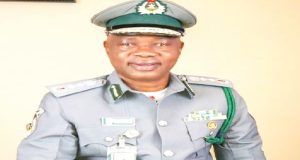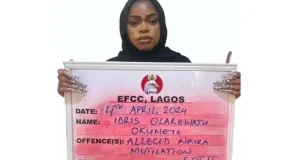The conspiracy theories attempting to explain the Boko Haram crisis can be marked into two broad categories: one focusing on machinations of internal actors, the other on external actors. Internal actors may include the disgruntled northern power elite who, having lost power, are bent on bringing down Nigeria under a southern leadership, as well as the Jonathan administration itself, which may be sponsoring the crisis in order to rally southern support behind his administration, and there is also the perception that Boko Haram may be a secret society controlled by some ‘invisible’ hands that seek to destroy the north ahead of 2015 so as to forestall or weaken its bid for the presidency at that time . External actors, on the other hand, may include powerful western states like the United States, or neighbouring African states envious of Nigeria’s progress and stability.
For the first hypothesis regarding internal actors, which we understand as power gladiators , our position is that its merit probably lies in the profound feeling of marginalization emanating from the north-east, either in terms of perceived denial of socio-economic infrastructure and/or the Kanuri sense of marginalization from central power. The second hypothesis also contends that part of the support mobilization strategy was to portray Islam in bad light by hitting Christian targets. This hypothesis perhaps draws from instances where attempts or actual attacks on Southern and Christian targets both in the north and south, which were blamed on Boko Haram, but were traced to Christian southerners . Similarly, in November 2011, the State Security Services (SSS) also paraded a syndicate that circulated terror messages, which prompted some foreign diplomatic missions to issue warnings that emptied Abuja’s high-brow hotels. The group was comprised southern Christians and not Muslims nor northerners. From a northern perspective, these cases suggest that Boko Haram is now the new weapon used by various interest groups to cause violence, mislead and confuse Nigerians in order to achieve their selfish agenda. It is difficult to comprehend how Christians who continue to fall victims of attacks on their places of worship and Southerners who are being asked to flee to part of the country, from where most have spent the greater parts of their lives and built multi-million naira businesses, and who have asked Jonathan to quit if he cannot lead will rally behind a government which has proved incapable of protecting them.
Although the United States continues to deny predicting Nigeria’s disintegration by 2015 – pointing out that a private agency, not the US government carried out the survey upon which the report is predicated – those who emphasize this aspect of the external conspiracy theory point to a 2008 war game conducted by the US army which was designed to test its response ability to probable state failure in Nigeria in relation to US energy needs. Recently the US government has declared $7 million bounty placed on Abubakar Shekau the Boko Haram Leader for information that would lead to his immediate arrest and prosecution. The oil-rich Middle East has historically been unstable, and resurgent Islam has compounded the problem. Nigeria’s far north is contiguous to the troubled Sahel and Maghreb regions, which also are contiguous to the some Middle East states in the grip of Islamism. The US interest in Nigeria’s oil does not predispose it to be comfortable with such proximity to this potentially Islamist enclave. At a one-day symposium on ‘international conspiracy: towards Nigeria’s disintegration,’ in Kaduna, North-West Nigeria, the Association of Muslim Brotherhood of Nigeria (AMBON) noted that “there were reasons to believe that the peace and security of Nigeria were being threatened by the western world powers for their economic gains; that the western world threatens the peace of the country in order to protect their economic interest in Nigeria’s oil region” (Daily Trust, February 3, 2012). In the opinion of one member of Nigeria’s National Intelligence Agency (NIA), the US might be aiming to severe the oil-rich Niger Delta or the south from the far north in order to insulate the former from the emerging Islamist activism in the north with the ultimate goal of securing the vital oil resources in the south. It would be preposterous to assume, however, that the US military could guarantee America’s energy interest in Nigeria within the context of a failed Nigeria balkanized into several fiefdoms.
Sentiments such as these have led to reservations over state efforts to collaborate with foreign powers to combat the Boko Haram. According to Professor Tam David West, Nigeria’s former minister of petroleum, “When they come ostensibly for security, they have their own agenda to penetrate our system and subjugate the sovereignty of the country; not only that, they become a powerful force within the country to dictate the political direction”. A member of Nigeria’s security forces, Uche Nwogu, also shares this concern without naming any country in particular, she notes that “by the time these people come in the name of helping us fight Boko Haram, they would have understudied their modus operandi and would themselves start bombing us while we assume it is still Boko Haram”
The scenario in the Arab states tends to validate these musings. According to Professor Michel Chossudovsky et al., in the Global Research Online Interactive Reader Series (GR1S), Western powers used “Political Islam” – including the Muslim Brotherhood and Al Qaeda-affiliated groups – to pursue their hegemonic objectives. Covert operations, they note, were launched to weaken the secular state, foment sectarian violence, and create social divisions throughout the Arab World. In Libya, they contend, “the “pro-democracy” rebels were led by Al Qaeda affiliated paramilitary brigades under the supervision of NATO Special Forces. The much-vaunted “Liberation” of Tripoli was carried out by former members of the Libya Islamic Fighting Group (LIFG) to destabilize of sovereign state.
The 2005 report was followed by a February 2011 version prepared by US military experts which stated as follows:
Although inherited and chosen layers of identity will be as “authentic” as conventional categories of citizenship and nationality, one category possibly will continue to stand out. Islam will remain a robust identity. Sectarian and other differences within Islam will be a source of tension or worse. The challenge of Islamic activism could produce a more intense backlash of Christian activism. Nigeria, Ethiopia, and other places in Africa will remain battlegrounds in this sectarian struggle. In 2025, notions of multiethnic integration and the value of “diversity” could face a combination of challenges from nationalists [and] religious zealots.
A pattern in Boko Haram’s insurgency – targeting ethnic and religious fault-lines – appears designed to enact the 2025 scenario described above. Hundreds of deaths of members of the Igbo ethnic nationality in the terror attacks in the north, for instance, have precipitated a ‘return home’ by the easterners and a warning that no ethnic group in Nigeria has monopoly of violence. Amid escalating violence, Igbo leaders have warned that the violence inflicted on their people residing in the north approximate the sequence of events that culminated in the tragedy of the Nigeria civil war . On the one hand, there is a perspective that links the attacks on the Igbos to the group’s overwhelming electoral support for Jonathan in 2011, which amounted to over 98% of the votes cast in the eastern region. On the other hand, leaders of Jonathan’s Ijaw ethnic nationality also warn against “subterranean moves, to destroy the fabric of unity of this country, at a time the leadership of the country is entrusted to our son [and] that no ethnic nationality is a sole repository of violence”. From the North, the Arewa Youth Development Foundation, spoke about “recent remarks by South-East (Igbo) and South-South (Ijaw) leaders” and warned that should the tendencies continue, “We would be left with no option than to tell other regions that feel like disintegrating, that the North welcomes it too” (Blueprint, online, January 31, 2012). On the other plane, although the Nigerian Muslim leadership maintains that Islam and Christianity are not at war in Nigeria, (Tribune, online, December 28, 2012), the Christian leadership urges adherents to defend themselves against attacks while a leading Pentecostal cleric, Bishop David Oyedepo claims God has anointed him “to lead a revolution against the jihadists. [And that] If the church should arise, Nigeria will no more be a nation,” (Tribune, January 23, 2012).
Allegations of conspiracy by envious neighbours to undermine Nigeria remain highly speculative, especially when considered in light of the military cooperation between Nigeria and its neighbouring countries in the war against transnational terrorism, and their common interest in regional stability.
This study has examined various theories attempting to explain the driving forces behind the Boko Haram phenomenon. Our position is that each of the perspectives offers some degree of insight into the problem, as well as the general patterns of political tension and social violence in Nigeria, which Boko Haram merely epitomizes.
In any case, it is clear that Boko Haram has metamorphosed from a strictly religious movement to one espousing a political agenda. While acknowledging the difficulties in getting to the root cause of the problem, the government must at least address the issues related to Jonathan’s decision to contest the 2011 presidential elections against the power rotation principle designed by his political party, the PDP, and his speculated 2015 presidential ambition. Irrespective of the constitutional provisions on individual political rights and aspirations, solemn attention needs be paid to professor Ekeh’s postulate that, “The historical condition in which the Nigerian state emerged has precluded its integration into a composite society” (1989:8). Any efforts at effecting enduring stability in Nigeria, therefore, must recognize her complex plurality, respect the sensitivity of the component parts, and refrain from acts of political impunity.
WILLIAMS EKPOSON
intelligencewatchdogs@yahoo.com
08034505234
 Newsfront Online …Telling the Public as it is
Newsfront Online …Telling the Public as it is



